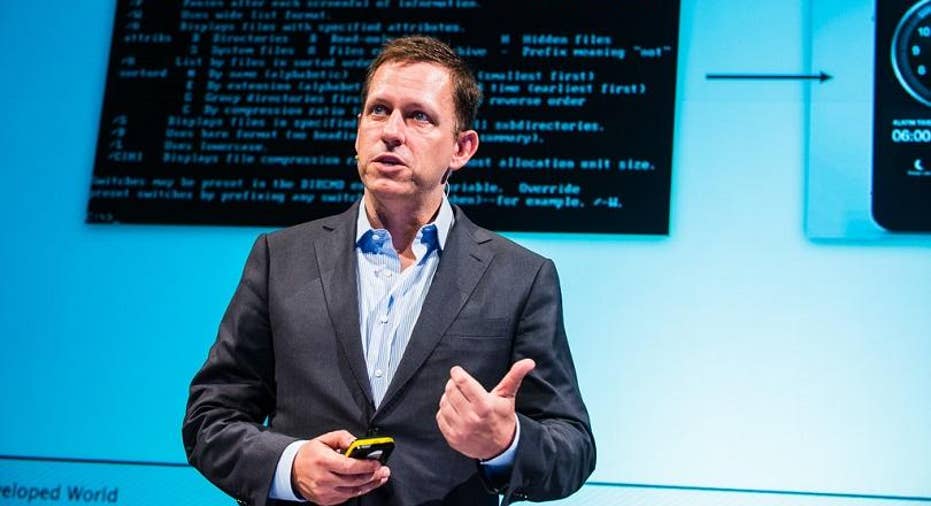Peter Thiel Speaks for Silicon Valley's Silent Minority

It’s almost painful to watch Peter Thiel speak in public. Cerebral and awkward, the tech billionaire seems about as comfortable in that role as Star Trek’s Mr. Spock was with human emotion. Mr. Charismatic he is not. And his support for Donald Trump has made him something of a pariah in the liberal-leaning Bay Area.
But then, the Silicon Valley venture capitalist is no stranger to controversy nor friend of common doctrine. He’s known for flying in the face of the status quo, having built a solid reputation as the highly successful co-founder of PayPal and Palantir and early backer of Facebook, LinkedIn and Yelp, among many others.
Unlike most people, who Thiel once called “disturbingly herdlike,” he intuitively grasps the fundamental principle that you can’t disrupt markets by following the crowd. “As an investor-entrepreneur, I’ve always tried to be contrarian, to go against the crowd, to identify opportunities in places where people are not looking,” he said.
Yesterday, the man who much prefers to operate behind the scenes challenged his own comfort zone, walking into the lion’s den at the National Press Club in Washington D.C. to explain why he was backing the Trump campaign when the extremely vocal majority of Valley elites clearly despise the man.
Thiel spoke with uncharacteristic passion as he described a nation in steep decline, deep debt, and and even deeper denial of the harsh realities of free trade and bubble economics that have devastated America’s heartland while enriching a permanent political class.
“For a long time, our elites have been in the habit of denying difficult realities. That’s how bubbles form,” he said. “Whenever there is a hard problem but people want to believe in an easy solution, they will be tempted to deny reality and inflate a bubble.”
Not mincing words, Thiel essentially called baby boomers suckers for one bubble after another: the dot-com bubble and market crash of 2000, the housing bubble and great recession of 2008, an annual trade deficit of $500 billion, and the never-ending wars that have cost our nation trillions of dollars and thousands of lives.
While he does not agree with everything Trump says and does, Thiel believes that voters “pull the lever” for what a candidate stands for, not for his flaws. He sees Trump as an outsider who can break the chain of political dynasties and chronic leadership failure and break America of its bubble addiction.
Before we get too caught up in Thiel’s libertarian doctrine, let’s not overlook the obvious. Even if you agree with much of what he says, it might seem just a tad bit hypocritical for a tech billionaire to accuse beltway insiders of living in an ideological bubble, given Silicon Valley’s similar insular mentality.
On the contrary, Thiel judges himself and his brethren as harshly as he judges anyone else.
As the Don of the PayPal Mafia who played a key role in the social media revolution that dominates our digital lives, Thiel is nevertheless profoundly disappointed with its lack of broad economic impact in terms of jobs and productivity. Indeed, the internet economy has benefited a relatively few number of companies and individuals – certainly not the middle class.
It’s telling that the manifesto of Thiel’s investment company, Founders Fund, begins with a question, What happened to the future? Even more telling is Thiel’s famous pat answer: “We wanted flying cars, instead we got 140 characters,” a blatant jab at Twitter. Interestingly enough, the man has virtually no online presence whatsoever. The irony.
Thiel does put his money where his mouth is, funding numerous philanthropic causes. And besides Airbnb, Lyft and Spotify, the fund’s investment portfolio includes a number of companies whose products will go a long way to serving the greater good, including cancer drug maker Stemcentrx and fellow PayPal buddy Elon Musk’s SpaceX.
Towards the end of his speech, Thiel mentioned the Manhattan project, interstate highway system and Apollo program as evidence that Washington wasn’t always broken. But if we want to return to that standard of competence, he said, “we cannot let free market ideology serve as an excuse for decline.”
Trump represents a new American politics that “overcomes denial, rejects bubble thinking and reckons with reality,” he said. “When the distracting spectacles of this election season are forgotten and the history of our time is written, the only important question will be whether or not that new politics came too late.”
In any case, nobody can dispute Thiel’s courage for once again going up against the status quo, speaking out on behalf of Trump and giving voice to The Valley’s silent minority who feel the same way.



















